对住院医生进行精神科问诊模拟教学:比较同伴间角色扮演和教师角色扮演对临床技能信心的影响。
IF 1.2
4区 医学
Q4 NEUROSCIENCES
Encephale-Revue De Psychiatrie Clinique Biologique et Therapeutique
Pub Date : 2025-02-01
DOI:10.1016/j.encep.2023.11.027
引用次数: 0
摘要
目的比较采用两种角色扮演模式的精神科问诊模拟教学项目对一年级精神科住院医师精神科临床技能信心的影响:教学计划包括每月七节课,每节课两小时,由两名精神科医生和学术教师主持。在同伴角色扮演组中,学生扮演病人或医生,病例情景由学生提出;在教师角色扮演组中,教师扮演病人,病例情景由教师编写。两组的模拟汇报均由教师指导。在教学计划前后,通过精神科临床技能信心问卷(CPCQ)对学生的信心进行了测量:结果:两种策略都显著提高了 CPCQ 总分。结果:两种策略都能显著提高 CPCQ 总分,但同伴间角色扮演项目对 CPCQ 总分的提高幅度更大:讨论:与教师角色扮演相比,同伴角色扮演可以更好地理解患者的观点,减少模拟情景中的表现焦虑,并提供一个部分即兴的情景,更容易转移到现实生活中的临床经验中:结论:与教师角色扮演相比,采用同伴角色扮演法进行精神科问诊教学更能提高学生对临床技能的信心。本文章由计算机程序翻译,如有差异,请以英文原文为准。
Simulation-based teaching of psychiatric interviewing to residents: A comparison of peer-to-peer and teacher role-play on confidence in clinical skills
Objective
To compare the effects of two simulation-based teaching programs of psychiatric interviewing using two role-play modalities on first-year psychiatry residents’ confidence in their psychiatric clinical skills.
Methods
The teaching program consisted of seven 2-hour sessions per month led by two psychiatrists and academic teachers. In the peer-to-peer role-play group, students played either the patient's or doctor's role, and case scenarios were proposed by the students; in the teacher role-play group, a teacher played the patient’ role and case scenarios were written by teachers. Simulation debriefing was teacher-guided in both groups. Confidence was measured with the Confidence in Psychiatric Clinical Skills Questionnaire (CPCQ) before and after the teaching program.
Results
Both strategies induced a significant improvement in the CPCQ total score. However, the peer-to-peer role-play program induced a significantly larger improvement in the CPCQ total score.
Discussion
Compared to teacher role-play, peer-to-peer role-play may enable a better comprehension of the patient perspective, reduce performance anxiety during the simulated scenario, and provide a partly improvised scenario that is more transferable to real-life clinical experiences.
Conclusion
Teaching psychiatric interviewing using the peer-to-peer role-play approach enables greater improvement in confidence in clinical skills than teacher role-play.
求助全文
通过发布文献求助,成功后即可免费获取论文全文。
去求助
来源期刊
CiteScore
4.60
自引率
7.40%
发文量
162
审稿时长
6-12 weeks
期刊介绍:
Une revue française de renommée internationale.
- Un comite de rédaction représentant tous les aspects de la prise en charge psychiatrique du patient.
- Une sélection rigoureuse d''articles faisant l''objet de plusieurs expertises.
- Des travaux d''auteurs et de chercheurs de renommée internationale.
- Des indexations dans les grandes bases de données (Current Contents, Excerpta Medica, etc.).
- Un facteur d''impact qui témoigne de la grande notoriété de la revue.
La tribune des publications originales de haut niveau.
- Une très grande diversité des sujets traités, rigoureusement sélectionnés à travers des sommaires dynamiques :
- des éditoriaux de médecins référents,
- une revue de presse sur les actualités internationales,
- des articles originaux pour approfondir vos connaissances,
- des mises au point et des cas cliniques pour engager votre réflexion sur les indications et choix possibles au travers de mises en situation clinique,
- des dossiers thématiques pour faire le tour d''une question.
- L''actualité de l''AFPB : L''Encéphale publie régulièrement des comptes rendus de l''Association française de psychiatrie clinique.

 求助内容:
求助内容: 应助结果提醒方式:
应助结果提醒方式:


